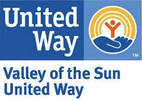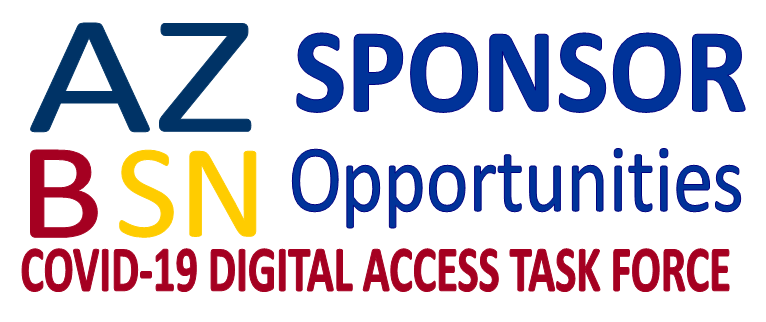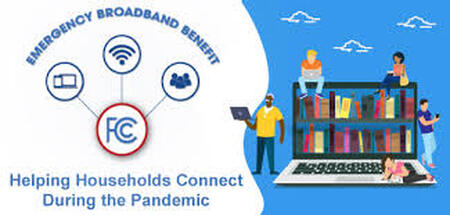|
Digital Access Task Force Meeting
Monday May 10, 2021 Special Meeting: 7:30 - 9:00 a.m. Next Task Force Meetings - May 10, 17, 24. No meeting May 31 Memorial Day We will begin promptly at 7:30 am! See Meeting Agenda Tab below Please engage by video rather that just audio so that we can also share our screens with you. Zoom Meeting ID: 919 9321 8962 Join the Meeting Password AZBSN Phone: Dial by your location
You will be prompted to enter your unique participant ID - Press # to skip Registration Required: To enable collaboration, we are requiring you to register when you join the meeting so that we can capture and share presenter and attendee contact info. This contact info will then be included in the meeting report.
Download Task Force Reports and Other Presentations
Missed the May 3 Task Force Meeting?
Contact Info
Steve Peters, AZBSN and Task Force Coordinator [email protected] Phone or Text: 520-321-1309 |
Vertical Divider
Want To Connect With
Task Force Colleagues? Link To Task Force Participant List The list includes only those who have completed our Google Form Are you Included? You could be! April 26 Digital Access
Resource Highlight Presentation May 10 Local First Economic Recovery Center: Kimber Lanning, CEO, Local First Arizona Foundation.
Local First has launched the Local First Economic Recovery Center to enable more qualified Arizona cities, towns, counties, and nonprofits to win competitive federal, state, and foundation grants. The Center serves communities statewide by: Researching and simplifying grants and stimulus opportunities; Identifying funding sources for large and small projects; Connecting funding sources to communities in need of funding; Providing the capacity for grant writing, facilitation, and project management to ensure success rates for qualifying communities and nonprofits. Kimber will provide an overview of the Recovery Center resources, and explore opportunities for cooperation and collaboration between AZBSN and the Recovery Center. This is an awesome resource that can help further both AZBSN’s and your digital access initiatives. It is consistent with the funding recommendations included in the AZBSN Strategy Report. Contact: Kimber Lanning, CEO | Local First Arizona Foundation, localfirstazfoundation.org, O: 602-956-0909 ext. 5 |
Arizona And FCC Emergency Broadband Program
On May 12 the FCC will officially launch the new Emergency Broadband Program. As you may know, the EBB addresses the unprecedented need by low-income households for affordable digital access resources including Internet and devices such as computers and cell phones. The EBB provides eligible households a subsidy of up to $50 per month on Internet service, or $75 per month for those living on Tribal lands. The EBB may also provide eligible households a one-time discount of up to $100 to purchase a laptop, desktop or tablet computer. It is urgent that we get the word out and help eligible low-income households register for this program ASAP. EBB is a limited funding and limited duration benefit program so we need to act now to help Arizona low-income consumers get signed up before time and money run out.
A statewide Arizona coalition of government, education and nonprofit organizations is asking for your participation in a statewide campaign to get eligible households signed-up ASAP. We know that for many people signing up for government programs can be scary and complicated so we are asking schools, libraries, non-profit and faith-based organizations, social service and health care agencies, and local and state governments to help get the word out to your constituencies about the EBB program, and to help them register for these benefits.
The AZBSN COVID-19 Digital Access Task Force is participating in the Coalition, led by Arizona State Library, Archives & Public Records, School Connect, Common Sense Media and United Way of Tucson and Southern Arizona, in cooperation with many other government and nonprofit organizations such as the Arizona Rural Schools Association, the Arizona Telemedicine Program, the Arizona Department of Education, and economic development organizations. They are collaborating on a promotion strategy and EBB Toolkit to make it easier for your organization to access the information you may need. The toolkit was developed to share with your networks, school districts, education leaders, nonprofits, community organizations and others.
The toolkit is housed on the Connect Arizona website, which also provides resources and guidance for individuals needing virtual learning opportunities for students, access to free WIFI hotspots and digital tech support.
A statewide Arizona coalition of government, education and nonprofit organizations is asking for your participation in a statewide campaign to get eligible households signed-up ASAP. We know that for many people signing up for government programs can be scary and complicated so we are asking schools, libraries, non-profit and faith-based organizations, social service and health care agencies, and local and state governments to help get the word out to your constituencies about the EBB program, and to help them register for these benefits.
The AZBSN COVID-19 Digital Access Task Force is participating in the Coalition, led by Arizona State Library, Archives & Public Records, School Connect, Common Sense Media and United Way of Tucson and Southern Arizona, in cooperation with many other government and nonprofit organizations such as the Arizona Rural Schools Association, the Arizona Telemedicine Program, the Arizona Department of Education, and economic development organizations. They are collaborating on a promotion strategy and EBB Toolkit to make it easier for your organization to access the information you may need. The toolkit was developed to share with your networks, school districts, education leaders, nonprofits, community organizations and others.
The toolkit is housed on the Connect Arizona website, which also provides resources and guidance for individuals needing virtual learning opportunities for students, access to free WIFI hotspots and digital tech support.
|
The toolkit includes:
|
Here Is How You Can Help
- Become an Outreach Partner. Get your organization involved to help get the word out to your constituencies about the EBB program, and to help them register for these benefits.
- Identify a Point of Contact within your organization to learn about the EBB, and the processes to help eligible consumers sign-up and take advantage of these programs
- Print and distribute EBB flyers to your constituents
- Provide funding to pay for flyers
Want to help? Contact:
- Tracey Beal [email protected]
- Ilana Lowery at [email protected]
- Nicole Umayam [email protected]
- Cindy Hogan [email protected]
- Steve Peters, Task Force Coordinator, [email protected] 520-321-1309
Agenda, Support, Events & Announcements, About The Task Force
May 10, 2021 Agenda
|
Tentative Agenda
Record Meeting
|
Vertical Divider
Updates and Digital Access
Resource Presentation Federal and State Updates
|
Task Force Support Needed From You
Task Force Marketing Committee – We Need Your Help ASAP!
The Task Force agreed that we need a marketing strategy to promote the Task Force and the Task Force Report and Recommendations. We will be forming a Marketing Committee/Team to formulate and oversee implementation of a marketing strategy. Interested in participating on this Team? Maybe you want to be a Cochair! Contact Steve ASAP 520-321-1309 or [email protected].
ATIC/GAZEL Database Update: To support the Task Force marketing plan we need to refresh the ATIC/GAZL database. We would appreciate any help you can provide in obtaining the following lists, preferably in Excel spreadsheets: All Mayors, City Managers, County Managers, Economic Development Directors, School Superintendents, important association and chamber of commerce executives, education advocacy organizations, telehealth and health care organizations, regional Association of Governments execs, municipal and school CTOs/CIOs, key government agency directors, key university and community college contacts, any other individuals and organizations that may be interested in our digital access initiatives.
The Task Force agreed that we need a marketing strategy to promote the Task Force and the Task Force Report and Recommendations. We will be forming a Marketing Committee/Team to formulate and oversee implementation of a marketing strategy. Interested in participating on this Team? Maybe you want to be a Cochair! Contact Steve ASAP 520-321-1309 or [email protected].
ATIC/GAZEL Database Update: To support the Task Force marketing plan we need to refresh the ATIC/GAZL database. We would appreciate any help you can provide in obtaining the following lists, preferably in Excel spreadsheets: All Mayors, City Managers, County Managers, Economic Development Directors, School Superintendents, important association and chamber of commerce executives, education advocacy organizations, telehealth and health care organizations, regional Association of Governments execs, municipal and school CTOs/CIOs, key government agency directors, key university and community college contacts, any other individuals and organizations that may be interested in our digital access initiatives.
Task Force Database Update – Please Respond ASAP
Task Force Collaborators - Yes That is You!
Since the creation of the Task Force we have added many new people to our Team. Some of you requested participation, some were referred by others. Anyway, to make a long story short, we do not have complete contact information about many of you. In order to encourage greater collaboration, please take a couple of minutes to fill out this Google Form to provide us your name, organization, title, phone, mobile # (optional), email, web site link, and a short description about you or your organization(also optional). Your mobile number would be helpful to enable us send an occasional text message. We would like to start sharing this information with the Task Force.
Task Force Collaborators - Yes That is You!
Since the creation of the Task Force we have added many new people to our Team. Some of you requested participation, some were referred by others. Anyway, to make a long story short, we do not have complete contact information about many of you. In order to encourage greater collaboration, please take a couple of minutes to fill out this Google Form to provide us your name, organization, title, phone, mobile # (optional), email, web site link, and a short description about you or your organization(also optional). Your mobile number would be helpful to enable us send an occasional text message. We would like to start sharing this information with the Task Force.
Amazon Smile – Support the Task Force For Free
Do you shop at Amazon? Now you can support the Task Force with no expense to you. All it takes is a couple of minutes of your time. AmazonSmile is a simple way for you to support the Task Force every time you shop, at no cost to you. AmazonSmile is available at smile.amazon.com on your web browser and can be activated in the Amazon Shopping app for iOS and Android phones. When you shop at AmazonSmile, you’ll find the exact same low prices, vast selection and convenient shopping experience as Amazon.com, with the added benefit that AmazonSmile will donate 0.5% of your eligible purchases to the charitable organization of your choice. GAZEL, the Greater Arizona Educational Leadership one of the Task Force’s lead organizations, is a registered Amazon Smile 501(c)(3) organization. Just select Greater Arizona Educational Leadership when you sign up for Amazon Smile. See this Amazon Smile web page for additional details.
Do you shop at Amazon? Now you can support the Task Force with no expense to you. All it takes is a couple of minutes of your time. AmazonSmile is a simple way for you to support the Task Force every time you shop, at no cost to you. AmazonSmile is available at smile.amazon.com on your web browser and can be activated in the Amazon Shopping app for iOS and Android phones. When you shop at AmazonSmile, you’ll find the exact same low prices, vast selection and convenient shopping experience as Amazon.com, with the added benefit that AmazonSmile will donate 0.5% of your eligible purchases to the charitable organization of your choice. GAZEL, the Greater Arizona Educational Leadership one of the Task Force’s lead organizations, is a registered Amazon Smile 501(c)(3) organization. Just select Greater Arizona Educational Leadership when you sign up for Amazon Smile. See this Amazon Smile web page for additional details.
About The Task Force
|
Due to the COVID-19 global pandemic the world is creating the largest telecommunity of all time. Social and physical distancing is becoming the new normal requiring unpresented demand for digital access for all Arizona communities including tribal, rural and other underserved communities and low-income neighborhoods in Arizona.
AZBSN, the Arizona Broadband Stakeholder Network, led by ATIC, the Arizona Telecommunications and Information Council, GAZEL, the Greater Arizona Educational Leadership organization, in cooperation with many other stakeholder organizations, have created an AZBSN COVID-19 Digital Access Task Force. |
What Is Digital Access
Digital access is more than just access to fast affordable and reliable Internet access. Everyone, especially students, also require access to technology such as computers, laptops, and smart phones as well as other digital equipment such as routers, hotspots, and web cameras. They also need digital content resources and skills to effectively use technology. |
The Task Force will:
Participation will include representation from: state and local government officials, public policy makers, rural community leaders, economic development, education, local or state government, health services, public safety, libraries, telecommunications and technology companies, and more.
- Facilitate collaboration, coordination, information sharing and communication among key public, private and nonprofit stakeholders
- Collaborate on priority initiatives for schools, libraries, telemedicine, communities, and more
- Develop a statewide COVID-19 digital access strategy to support, schools, universities, community colleges, students, homes, libraries, health care facilities, businesses and communities
- Identify and advocate for funding to enable implementation of COVID-19 Digital Access Projects
Participation will include representation from: state and local government officials, public policy makers, rural community leaders, economic development, education, local or state government, health services, public safety, libraries, telecommunications and technology companies, and more.
AZBSN COVID-19 Task Force Plans and Subcommittees
- Regular Task Force informational, coordinating and planning meetings
- Task Force Subcommittees including Education, Libraries, Telemedicine, Service Providers, Communities, and Funding
- Regular Community, Stakeholder, and Citizen Communications by newsletters, webinars, web site and informational meetings, social media, etc.
- Service Provider Resources with Arizona Contacts
- Federal and State Digital Access Briefings
- Short Term Initiatives
- Online Database: Resources, Needs, Contacts, etc.
- Collaboration Platform
- A State plan defining short term plans and priorities that will identify challenges, barriers and recommendations related to key issues including Education, Libraries, Telemedicine, Service Providers, Communities, and Funding
- AZBSN COVID-19 Digital Access Task Force Web Pages, with links to and from the Arizona Commerce Authority and other sites providing related information
- Statewide Webinars and stakeholder informational meetings
- AZBSN Newsletters to all relevant stakeholders in Arizona
- Social Media Announcements
Teams will address the following questions:
- What do you perceive are the major Digital Access/Digital Inclusion needs such as Internet access and devices, as well as training, funding and technical support. What are the issues/barriers?
- What specific strategies, initiatives, resources, partnerships, technologies or opportunities can we recommend to help address these needs. If we can determine it, what specific funding do we need?
- Who else needs to be involved in your Committee?
- Others Questions?
- Education and Libraries: What are the Digital Access/Digital Inclusion needs such as Internet access and devices, as well as training, funding and technical support are needed for libraries and library patrons, public and private K-12 schools, community colleges, universities, students, families, faculty, community? What are the barriers? What specific strategies, initiatives, resources, partnerships, technologies or opportunities can we recommend/initiate to help address these needs.
- Communities: What are the Digital Access/Digital Inclusion needs such as Internet access and devices, as well as training and funding to support community needs such as small business owners and employees, economic development, government services, public safety, nonprofit organizations, etc. What are the barriers? What specific strategies, initiatives, resources, partnerships, technologies or opportunities can we recommend/initiate to help address these needs.
- Technology: (changed from Service Providers): What Digital Access/Digital Inclusion technologies should be considered to provide Internet access to schools, libraries, families and communities such as wire line, satellite, mesh networks, cellular microwave, WiFi on buses, open schools and libraries Erate networks. What kinds of devices are needed and should be considered such as computers and tablets, cell phones, hot spots, web cams, software, conferencing services?
- Funding/Resources: What funding and resources opportunities are there such as federal, state and local funding, foundations, donation campaigns, volunteer support, refurbished equipment, donations and support from Internet providers and technology companies, etc.
Subcommittee Teams
- Education
- Libraries
- Communities
- Technology
- Funding








